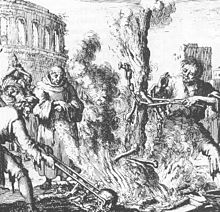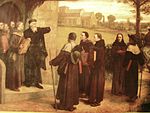
Arnoldists were a Proto-Protestant Christian movement in the 12th century, named after Arnold of Brescia,[1] an advocate of ecclesiastical reform who criticized the great wealth and possessions of the Roman Catholic Church,[2] while preaching against infant baptism and transubstantiation.[3] His disciples were also called "Publicans" or "Poplecans", a name probably deriving from Paulicians (the term "Publicani" would be generally used for any heretic, even a political traitor, through Europe).[4]
The Arnoldists were condemned as heretics by Pope Lucius III in Ad abolendam during the Synod of Verona in 1184.[5]
Arnoldists' tenets would later be addressed by Bonacursus of Milan, c. 1190, in his Manifestatio haeresis Catharorum, which refuted Arnoldist apostolic poverty and the incapacity of sinful priests to administer the sacraments.[6]
See also
[edit]Notes
[edit]- ^ Russell 1992, p. 47.
- ^ Russell 1992, p. 35.
- ^ A Brief Sketch of the History of the Foreign Baptists By G. H. ORCHARD 1842
- ^ Garsoïan, Nina G. (1967). The Paulician heresy: a study of the origin and development of Paulicianism in Armenia and the Eastern Provinces of the Byzantine empire. Walter de Gruyter. pp. 13–26. ISBN 978-3-11-134452-2.
- ^ Lambert 1977, p. 72.
- ^ Lambert 1977, p. 59.
References
[edit]- Lambert, Malcolm (1977). Medieval Heresy: Popular Movements from Bogomil to Hus. Edward Arnold Publishers Ltd.
- Russell, Jeffrey Burton (1992). Dissent and Order in the Middle Ages: The Search for Legitimate Authority. Wipf & Stock publishers.

Well, that’s interesting to know that Psilotum nudum are known as whisk ferns. Psilotum nudum is the commoner species of the two. While the P. flaccidum is a rare species and is found in the tropical islands. Both the species are usually epiphytic in habit and grow upon tree ferns. These species may also be terrestrial and grow in humus or in the crevices of the rocks.
View the detailed Guide of Psilotum nudum: Detailed Study Of Psilotum Nudum (Whisk Fern), Classification, Anatomy, Reproduction